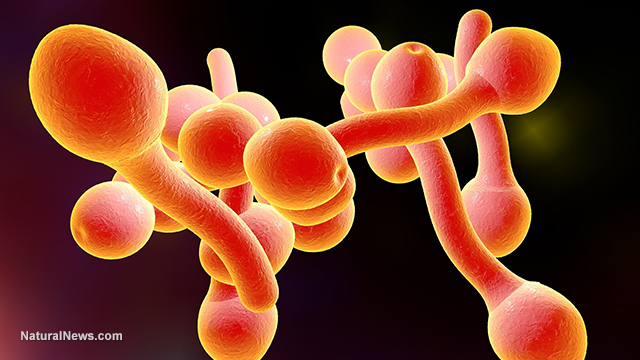TODAY IS
Latest topics
LIVE TRAFFIC FEED
RESEARCHERS IDENTIFY FUNGUS AS A KEY FACTOR IN CROHN'S DISEASE
END TIME NEWS, A CALL FOR REPENTANCE, YESHUA THE ONLY WAY TO HEAVEN :: CHRISTIANS FOR YESHUA (JESUS) :: INFECTIOUS DISEASE, SUPERBUGS, ILLNESS, PLAGUES, ETC
Page 1 of 1
 RESEARCHERS IDENTIFY FUNGUS AS A KEY FACTOR IN CROHN'S DISEASE
RESEARCHERS IDENTIFY FUNGUS AS A KEY FACTOR IN CROHN'S DISEASE
Researchers identify fungus as a key factor in Crohn's disease
Sunday, October 02, 2016 by: David Gutierrez, staff writer
Tags: Crohn''s disease, candida, microbiome

(NaturalNews) Scientists from Case Western Reserve University have identified a species of fungus that may play a key role in the development of Crohn's disease, in a study published in the journal mBio.
"We already know that bacteria, in addition to genetic and dietary factors, play a major role in causing Crohn's disease," lead author Mahmoud Ghannoum said. "Essentially, patients with Crohn's have abnormal immune responses to these bacteria, which inhabit the intestines of all people. While most researchers focus their investigations on these bacteria, few have examined the role of fungi, which are also present in everyone's intestines."
The study strengthens the evidence that a healthy microbiome – the billions of microorganisms that live naturally in and on the human body, particularly in the gut – plays a key role in regulating immune health and preventing inflammatory bowel disease (IBD).
'Striking' differences in microbiome
Crohn's disease is one of the two major types of IBD, along with ulcerative colitis. IBD is characterized by inflammation of the gut producing sporadic flare-ups of intense pain, bloating, gas, cramps and alternating constipation and diarrhea.
The exact causes of IBD and its flare-ups remain poorly understood, although research suggests that there may be an autoimmune component to the disease. Crohn's in particular also seems to have a heavily genetic component, with 20 percent of sufferers having a close relative who also has IBD.
In the new study, the researchers took fecal samples from 20 people with Crohn's disease, 28 of their close relatives who did not have the disease, and 21 unrelated people without Crohn's or any family history of it. They found that in people with Crohn's disease, the bacteria E. coli and Serratia marcescens were interacting with the fungus Candida tropicalis to produce a biofilm in the gut. This film, in turn, triggered the inflammation characteristic of Crohn's disease.
The researchers further found that relatives of Crohn's patients had a relatively similar gut microbiome, but that the three microbial species were found in their guts in much smaller concentrations. The people with no family history of Crohn's, however, had a completely different microbiome composition.
"Among hundreds of bacterial and fungal species inhabiting the intestines, it is telling that the three we identified were so highly correlated in Crohn's patients," Ghannoum said.
While he called the differences between Crohn's families and non-Crohn's families "striking," he cautioned against assuming the difference to be genetic, or assuming that the microbes are the only factor causing Crohn's.
"For example, we know that family members also share diet and environment to significant degrees," he said.
Vitamin D for a healthy microbiome
Another known factor contributing to the risk and severity of Crohn's disease is low blood levels of immune-regulating nutrients, particularly vitamin D.
Low levels of vitamin D have been strongly linked to risk of a variety of autoimmune diseases, and in some cases vitamin therapy has even shown promise as a natural cure.
Preliminary research supports the potential of vitamin D to play all these roles in Crohn's disease. For instance, a study published in the Indian Journal of Medical Research in 2009 found that people with Crohn's disease had significantly lower levels of vitamin D than healthy controls, and that the people with the lowest levels also had the most severe form of the disease.
Vitamin D may also hold promise as a therapy or even cure. A 2010 study in the Journal of Biological Chemistry found that vitamin D acts directly on two genes that have been linked to Crohn's disease, one that encodes for anti-microbial proteins and one that helps alert the immune system to invasive microbes. And a 2012 study in BMJ Case Reports found strong anecdotal support for the effectiveness of vitamin D supplementation in a survey of reports by IBD patients.
Sources for this article include:
UPI.com
NaturalNews.com
Learn more: http://www.naturalnews.com/055498_Crohns_disease_candida_microbiome.html#ixzz4LwrjNUaS

Ara- Admin

- Join date : 2011-01-19
Location : USA
 Similar topics
Similar topics» REVERSE DISEASE WITH A PROVEN THERAPY TO ELIMINATE LIFE-THREATENING CANCERS AND TERMINAL LIVER DISEASE
» MAD COW DISEASE: THE DEADLY DISEASE IN MEAT THAT HEALTH OFFICIALS ARE IGNORING
» A CALL FOR AN UPRISING: CANNIBALISM DISEASE! KURU THE HUMAN MAD COW DISEASE EXPOSED! (SANTA CLARITA DIET SATANIC ILLUMINATI)
» NEVER MIND DROUGHT -- THE BIGGEST THREAT TO OUR FOOD SUPPLY IS FUNGUS
» DAHBOO 77 - SUPERBUG FUNGUS IS NEW MENACE IN U.S. HOSPITALS, MOSTLY IN NEW JERSEY AND NEW YORK
» MAD COW DISEASE: THE DEADLY DISEASE IN MEAT THAT HEALTH OFFICIALS ARE IGNORING
» A CALL FOR AN UPRISING: CANNIBALISM DISEASE! KURU THE HUMAN MAD COW DISEASE EXPOSED! (SANTA CLARITA DIET SATANIC ILLUMINATI)
» NEVER MIND DROUGHT -- THE BIGGEST THREAT TO OUR FOOD SUPPLY IS FUNGUS
» DAHBOO 77 - SUPERBUG FUNGUS IS NEW MENACE IN U.S. HOSPITALS, MOSTLY IN NEW JERSEY AND NEW YORK
END TIME NEWS, A CALL FOR REPENTANCE, YESHUA THE ONLY WAY TO HEAVEN :: CHRISTIANS FOR YESHUA (JESUS) :: INFECTIOUS DISEASE, SUPERBUGS, ILLNESS, PLAGUES, ETC
Page 1 of 1
Permissions in this forum:
You cannot reply to topics in this forum
 Sun 29 Aug 2021, 22:15 by Jude
Sun 29 Aug 2021, 22:15 by Jude